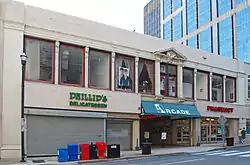Nashville Arcade
The Arcade is a covered shopping arcade in downtown Nashville, Tennessee, U.S.. It was built in 1902.
Nashville Arcade | |
 5th Avenue facade | |
  | |
| Location | Between 4th and 5th Aves., Nashville, Tennessee |
|---|---|
| Coordinates | 36°9′51″N 86°46′48″W |
| Area | 5 acres (2.0 ha) |
| Built | 1902 |
| Architect | Edgefield & Nashville Co. |
| NRHP reference No. | 73001761[1] |
| Added to NRHP | May 22, 1973 |
History
The arcade was developed by Daniel Franklin Carter Buntin and constructed by the Edgefield and Nashville Manufacturing Company.[2] It was Nashville's first shopping center, replacing the former Overton Alley. Located between Fourth and Fifth avenues,

The Arcade is at the center of the downtown Nashville Arts District and houses a very vibrant arts community. The Downtown Nashville First Saturday Art Crawl is a monthly event that takes place the first Saturday of every month from 6pm to 9pm. and draws large crowds. All galleries participate in this fun event. There are seventeen galleries in the building including:
- 40AU – 69 Arcade;
- Andy Anh Ha Gallery – 83 Arcade;
- BelArt Studio & Gallery – 56 Arcade;
- Blend Studio – 79 Arcade;
- The COOP – 75 Arcade;
- Corvidae Collective – 11 Arcade (downstairs)- www.corvidaecolletive.net;
- Craig Brabson Fine Art Photography – 64A Arcade;
- Gallery 44 – 44 Arcade;
- Hannah Lane Gallery – 64 Arcade;
- L Gallery – 73 Arcade;
- Nostos Gallery – 58-60 Arcade;
- O Gallery – 42 Arcade;
- OPEN – 57 Arcade;
- Space – 61 Arcade;
- Studio 66 – 66 Arcade;
- UltraViolet Gallery & Photography – 59 Arcade;
- WAG – 77 Arcade
Other notable tenants include The Peach Cobbler Factory, Phillyman where you can enjoy an authentic Philly Cheese Steak, original New York-style pizza at Manny's House of Pizza, The Peanut Shop[3] candy store and the Uptown Branch of the United States Postal Service, featuring an Art Deco facade.
Architectural design
The arcade was designed by Thompson, Gibel, and Asmus.[4] It was modeled after an arcade in Italy.[5] The entrances consist of identical Palladian facades. It has been listed on the National Register of Historic Places since May 22, 1973.[1]
References
- "National Register Information System". National Register of Historic Places. National Park Service. March 13, 2009.
- "National Register of Historic Places Inventory/Nomination: Nashville Arcade". National Park Service. Retrieved June 9, 2018. With accompanying pictures
- https://www.nashvillenut.com
- David H. Paine (August 1979). "National Register of Historic Places Inventory/Nomination: Third Baptist Church / Hopewell Missionary Baptist Church and Parsonage". National Park Service. Retrieved December 13, 2017. With eight photos from 1979.
- , "Nashville: Walking Tours", Frommer's.
| Wikimedia Commons has media related to Nashville Arcade. |